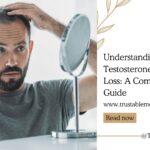Why Testosterone Is Important? Testosterone, often associated with virility and masculinity, plays a crucial role in both men’s and women’s health. Understanding its significance goes beyond stereotypical notions of strength and libido. Let’s delve into why testosterone is important and explore its multifaceted impact on human health.
Understanding Testosterone
What is Testosterone?
Testosterone stands as the primary male hormone, although it also exists in females in smaller amounts. It governs a range of physiological processes, from sexual development to mood regulation.
Anabolic steroids production primarily occurs in the testes in males and the ovaries in females. The pituitary gland, situated at the base of the brain, orchestrates this process by releasing hormones that stimulate testosterone production.
It influences various aspects of human health, including sexual development, muscle mass, bone density, and mood regulation. Its effects extend far beyond stereotypical notions of masculinity, impacting both men’s and women’s well-being.
Factors Affecting Testosterone Levels
anabolic steroids levels can fluctuate due to numerous factors. Age plays a significant role, with anabolic steroids levels gradually declining with advancing age. Lifestyle choices, such as diet, exercise, and sleep patterns, also influence testosterone production.
Environmental factors, including exposure to chemicals and stress, can disrupt hormonal balance and affect anabolic steroids levels. Medical conditions like obesity, diabetes, and Underactive testicles may also impact testosterone production.
anabolic steroids in a nutshell:
Imagine a special chemical in your body, like a tiny messenger. This is testosterone, found in both men and women, though more in men. It helps with lots of things:
Growing up: Like building muscles and bones, deepening your voice (in men), and starting periods (in women).
Feeling good: Giving you energy, mood, and a healthy sex drive.
Staying strong: Keeping your bones and muscles healthy as you age.
Many things can affect how much testosterone you have, like age, what you eat, how much you sleep, and even stress. If it gets too low, it can affect your energy, mood, and body in different ways.
Testosterone and Erectile Dysfunction
The male hormone anabolic steroids orchestrates a multifaceted symphony within the body, influencing not just physical characteristics like muscle mass but also vital aspects of sexual health.
From fueling the furnace of desire to supporting the production of virile sperm, testosterone plays a key role in every act of the play.
Erectile dysfunction (ED) is the inability to achieve or maintain an erection firm enough for sexual intercourse.
There is a link between testosterone and erectile dysfunction, but it is not a simple one. Low anabolic steroids levels can contribute to ED, but it is not the only cause. Other factors, such as heart disease, diabetes, and nerve damage, can also play a role.
To treat erectile dysfunction, you can on the other hand get Tadalista 60 or Fildena xxx
Erectile dysfunction (ED) doesn’t have to be an unspoken struggle.
Seeking professional help is crucial, as it unveils the root cause and unlocks personalized treatment paths. Addressing ED with a doctor empowers you to reclaim your sexual well-being.
Treatment for ED will vary depending on the cause. In some cases, testosterone replacement therapy may be helpful.
Here are some additional facts about testosterone and erectile dysfunction:
- anabolic steroids levels naturally decline with age.
- About 50% of men over the age of 50 experience some degree of ED.
- There are a number of effective treatments for ED, including medication, lifestyle changes, and devices.
If you are concerned about testosterone levels or erectile dysfunction, talk to your doctor. They can help you determine the best course of treatment.
Importance of Testosterone in Men’s Health
Sexual Health and Libido
Testosterone plays a pivotal role in male sexual health, influencing erectile function and libido. Optimal anabolic steroids levels are essential for maintaining sexual desire and performance.
Muscle Mass and Strength
Beyond sexual function, testosterone contributes to the development and maintenance of muscle mass and strength. It promotes protein synthesis within muscle tissue, facilitating muscle growth and repair.
Bone Health and Density
Anabolic steroids also plays a crucial role in maintaining bone density and strength. Low testosterone levels can increase the risk of osteoporosis and fractures, particularly in aging men.
Mental Well-being
In addition to its physical effects, anabolic steroids impacts mood and mental well-being. A cloud of low testosterone may cast a shadow over mental well-being, potentially triggering depression’s grip, irritability’s sparks, and cognitive decline’s fog. Unraveling this complex interplay can shed light on pathways to restoring vitality and clarity.
Men’s anabolic steroids: More Than Just Making Muscles Grow!
Why testosterone is important for male? Testosterone is like a superhero for men’s health, doing more than just pumping up muscles. Here’s what it helps with:
Being a stud: Keeps your sex drive strong and helps you “perform” well.
Building power: Helps you build and maintain muscles, making you feel strong and energetic.
Strong bones: Keeps your bones healthy and tough, preventing breaks.
Happy mind: Helps you feel good, reducing the risk of feeling down or forgetful.
Significance of Testosterone in Women’s Health
Hormonal Balance
In women, testosterone contributes to hormonal balance alongside estrogen and progesterone (Female hormones). It influences aspects of the menstrual cycle and fertility, underscoring its importance in women’s reproductive health.
Muscle Tone and Strength
It influences muscle tone and strength in women, albeit to a lesser extent than in men. Optimal Androgens levels support lean muscle mass and enhance athletic performance.
Bone Density and Osteoporosis Risk
Maintaining adequate Androgens levels is crucial for women’s bone health, particularly post-menopause. Low testosterone levels can accelerate bone loss and increase the risk of osteoporosis.
Cognitive Function and Emotional Well-being
It also affects cognitive function and emotional well-being in women. It plays a role in cognitive abilities and mood regulation, highlighting its broader impact on mental health.
Women and Testosterone: More Than Just a Man Thing!
Why testosterone is important for females? Even though you might think of it as a “guy thing,” it’s important for women too!
Keeping things balanced: It works with other hormones like estrogen to keep your periods regular and help you get pregnant when you want.
Staying strong: It helps you build and maintain muscle, especially when you exercise regularly.
Strong bones: Just like men, it helps keep your bones healthy and strong, especially after menopause.
Sharp mind and happy self: It can help you think clearly and feel good, reducing the risk of feeling down or forgetful.
Testosterone Deficiency: Causes and Effects
Underactive testicles
Underactive testicles refers to inadequate testosterone production, which can manifest as primary or secondary Underactive testicles. Various factors, including genetic conditions, medical treatments, and chronic illnesses, can contribute to Underactive testicles.
Symptoms of Low Testosterone
Low Androgens levels can lead to a range of symptoms, including fatigue, reduced muscle mass, erectile dysfunction, and diminished libido. Emotional symptoms such as depression and irritability may also arise.
Long-term Health Implications
Untreated anabolic steroids deficiency may have long-term health implications, including an increased risk of cardiovascular disease, metabolic disorders, and mental health issues. Addressing low testosterone levels promptly is crucial for mitigating these risks.
Diagnosis and Treatment Options
Diagnosing its deficiency typically involves blood tests to assess Androgens levels. Treatment options may include lifestyle modifications, such as diet and exercise, as well as testosterone replacement therapy (TRT) for severe cases.
Lifestyle Factors Affecting Androgens Levels
Diet and Nutrition
A balanced diet rich in essential nutrients is vital for maintaining optimal testosterone levels. Adequate intake of protein, healthy fats, and micronutrients like vitamin D, zinc, and magnesium supports hormonal health.
Exercise and Physical Activity
Regular exercise, particularly resistance training and cardiovascular exercise, can enhance testosterone production. Incorporating physical activity into daily routines promotes hormonal balance and overall well-being.
Sleep Quality and Quantity
Quality sleep is essential for hormone regulation, including its production. Establishing a consistent sleep schedule and creating a sleep-conducive environment are key strategies for optimizing Androgens levels.
Stress Management
Chronic stress can disrupt hormonal balance and suppress testosterone production. Adopting stress management techniques such as meditation, yoga, and mindfulness can help mitigate these effects.
Environmental Factors and Testosterone Disruption
Chemicals that mess with hormones
Exposure to endocrine-disrupting chemicals found in household products, plastics, and pesticides can interfere with hormone regulation, including its levels. Minimizing exposure to these chemicals is crucial for maintaining hormonal health.
Lifestyle Choices
Unhealthy lifestyle habits such as smoking, excessive alcohol consumption, and sedentary behavior can negatively impact testosterone levels. Making healthier choices promotes hormonal balance and overall well-being.
Psychological Stress
Chronic psychological stress can elevate cortisol levels and suppress testosterone production. Implementing stress-reduction techniques and seeking social support can help mitigate the effects of stress on hormone levels.
Occupational Hazards
Certain occupations may involve exposure to chemicals or working conditions that disrupt hormonal balance. Awareness of occupational hazards and implementing protective measures are essential for safeguarding hormonal health.
Strategies for Maintaining Optimal Testosterone Levels
Dietary Recommendations
Emphasize a diet rich in lean proteins, healthy fats, and nutrient-dense foods to support optimal anabolic steroids levels. Incorporate foods like lean meats, fish, nuts, seeds, and leafy greens into your meals.
Exercise Guidelines
Engage in regular physical activity, including both strength training and cardiovascular exercise, to stimulate testosterone production. Time-crunched but health-conscious? Aim for 150 minutes of moderate-intensity or 75 minutes of vigorous activity per week. Even short bursts throughout the day add up – park further, take the stairs, or squeeze in a quick workout video. Your health matters!
Sleep Hygiene Practices
Prioritize restorative sleep by establishing a consistent sleep schedule and creating a comfortable sleep environment. Limit exposure to electronic devices before bedtime and practice relaxation techniques to promote quality sleep.
Stress Management Techniques
Incorporate stress-reduction strategies such as meditation, deep breathing exercises, and mindfulness practices into your daily routine. Cultivate a supportive social network and seek professional help if needed to manage stress effectively.
FAQs
1. How do I know if my testosterone is low?
- You can’t know for sure without a blood test by a doctor. Some possible signs include low sex drive, erectile dysfunction, fatigue, and muscle loss. But these can also have other causes. See a doctor for diagnosis.
2. How to increase testosterone naturally?
- Yes, lifestyle modifications such as maintaining a healthy diet, engaging in regular exercise, prioritizing quality sleep, and managing stress effectively can help naturally boost Androgens levels.
3. What are the risks of TRT?
- Risks of TRT may include acne, fluid retention, breast enlargement, and an increased risk of cardiovascular events. It’s essential to discuss the potential risks and benefits of TRT with a healthcare provider.
4. What age is your testosterone at its highest?
- anabolic steroids levels typically peak during early adulthood and gradually decline with age. However, individual variations in Androgens levels may occur due to genetic, environmental, and lifestyle factors.
5. What are 3 effects of testosterone on the female body?
- anabolic steroids plays various roles in the female body. Here are 3 key effects:
- Libido and sexual function: It impacts sex drive, arousal, and overall sexual satisfaction. Low levels can decrease desire, while high levels can contribute to unwanted hair growth or voice changes.
- Bone and muscle health: It helps build and maintain bone density and muscle mass, critical for strength and preventing osteoporosis.
- Mood and energy: It contributes to energy levels, confidence, and motivation. Deficiencies can lead to fatigue, low mood, and decreased sense of well-being.
- It’s important to note that its levels naturally fluctuate throughout life and vary between individuals. Consulting a healthcare professional is crucial for understanding your specific needs and managing any potential imbalances.



